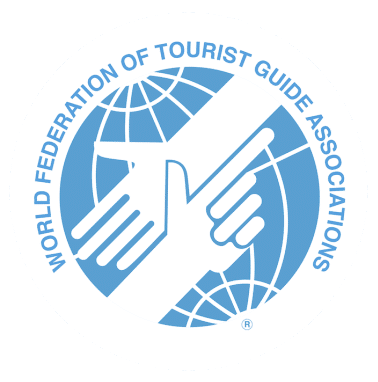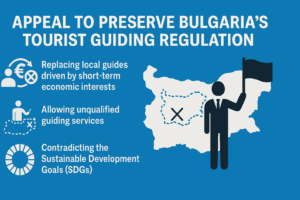he World Federation of Tourist Guide Associations (WFTGA) has formally appealed to the Ministry of Tourism of the Republic of Bulgaria to maintain its existing Tourist Guiding Regulation.
This regulation ensures that only qualified, certified guides may professionally practise in Bulgaria, safeguarding the quality, authenticity, and integrity of the country’s cultural tourism offer.
In our letter of 8 August 2025, we highlight the risks of deregulation – including the replacement of local guides by unqualified operators, the erosion of professional standards, and the contradiction with Bulgaria’s commitments to the United Nations Sustainable Development Goals (SDGs).
Below is the full text of our appeal to the Ministry of Tourism:
Dear Honourable Members of the Ministry,
On behalf of the World Federation of Tourist Guide Associations (WFTGA), I write to express our deepest concern regarding the proposals made during the 29 July 2025 meeting at your Ministry to abolish Bulgaria’s existing Tourist Guiding Regulation. As the global umbrella organisation representing professional tourist guides in over 70 countries and territories, we urge you to reconsider this course of action, which threatens not only the integrity of the guiding profession in Bulgaria but also the quality and sustainability of your national tourism sector.
Since its founding in 1985, the WFTGA has championed the professional recognition of tourist guides as key stakeholders in cultural interpretation, heritage conservation, and sustainable tourism development. The recent developments in Bulgaria risk undermining decades of progress both nationally and internationally in upholding high standards within the guiding profession.
We respectfully submit this appeal with the aim of highlighting:
- The vital role of certified tourist guides in protecting cultural heritage and delivering quality experiences;
- The detrimental consequences of deregulation for national tourism and international reputation;
- The alignment between professional guiding regulation and the United Nations Sustainable Development Goals (SDGs), to which Bulgaria is a committed signatory.
- The Role of Certified Tourist Guides in Cultural Preservation and Visitor Experience
Qualified tourist guides are not merely components of a tour package; they are cultural mediators, educators, and custodians of heritage. Their presence guarantees:
- Accuracy and Depth: Guides undergo rigorous training to convey Bulgaria’s multifaceted history, archaeology, religion, traditions, and modern society with accuracy, nuance, and cultural sensitivity.
- Cultural Integrity: Local certified guides promote authentic narratives that preserve the voice of the community and prevent the distortion of historical facts by unqualified outsiders.
- Responsible Engagement: Professional guides are trained in ethical group management, safety protocols, and sustainable tourism principles.
Removing regulatory protections would invite unqualified individuals to offer guiding services, leading to misinformation, cultural misrepresentation, and a significant decline in service quality. Furthermore, foreign guides often lack the linguistic, historical, and cultural competence to represent Bulgaria appropriately to international audiences.
- Consequences of Deregulation: A Threat to Quality, Economy, and Trust
The proposal to abolish the Tourist Guiding Regulation appears to be driven by short-term economic interests of certain tour operators seeking to reduce costs. However, such a move would have long-term, irreversible consequences:
- Loss of Professional Standards: Deregulation will remove the benchmarks for competency, training, and accountability that currently ensure the excellence of Bulgarian guides.
- Market Exploitation: Unregulated services risk becoming dominated by untrained and informal actors who operate without adherence to ethical or safety standards.
- Erosion of Tourist Confidence: Visitors place trust in government-backed certification systems. Removing these protections may lead to negative visitor experiences, decreased satisfaction, and reputational damage.
- Marginalisation of Local Professionals: Many of Bulgaria’s certified guides work not only with tour operators, but also independently, supporting municipalities, festivals, and cultural institutions. Their livelihoods and professional dignity would be severely compromised.
Furthermore, the lack of transparency in the Ministry’s consultation process raises concerns about democratic participation and the representation of sectoral voices, particularly those of working guides and their associations.
III. Regulation and the United Nations Sustainable Development Goals (SDGs)
The WFTGA views regulated guiding not only as a professional necessity but as a strategic tool for achieving the United Nations 2030 Agenda. Maintaining your national Tourist Guiding Regulation directly supports several SDGs, including:
- SDG 8: Decent Work and Economic Growth
Regulation provides stable, recognised employment for guides, many of whom are women, freelancers, or individuals in remote regions. It protects against exploitation and informal labour.- SDG 11: Sustainable Cities and Communities
Certified guides contribute to managing visitor flows, educating tourists on local customs, and protecting cultural sites from overuse and disrespect. They are frontline actors in promoting respectful tourism practices that benefit communities.- SDG 4: Quality Education
The training and certification of guides are part of lifelong learning opportunities, increasing professionalism and continuous education in heritage, communication, and intercultural dialogue.- SDG 5: Gender Equality
The guiding profession in many countries, including Bulgaria, is a key source of flexible, independent employment for women, caregivers, and marginalised groups. Regulation ensures their inclusion and protection.- SDG 12: Responsible Consumption and Production
Trained guides help influence visitor behaviour in responsible and sustainable directions, encouraging local purchasing and minimising environmental and cultural footprints.Removing the regulatory framework weakens these strategic contributions and contradicts the very goals Bulgaria has committed to through its alignment with the UN and EU tourism agendas.
Conclusion and Call to Action
Bulgaria stands at a crossroads. By upholding the current regulation, you will reinforce your nation’s commitment to excellence, authenticity, and sustainable development. Abolishing it, on the other hand, would lead to a deterioration in service quality, a loss of professional livelihoods, and the erosion of Bulgaria’s reputation as a cultural destination.
We respectfully call upon the Ministry of Tourism to:
- Preserve the Tourist Guiding Regulation currently in place;
- Initiate a transparent, inclusive dialogue with key stakeholders, including professional guiding associations;
- Promote the value of qualified tourist guides as essential partners in national tourism strategy.
WFTGA remains at your full disposal to assist with policy dialogue, international case studies, and technical guidance. We stand united with the Union of Bulgarian Tourist Guides and all professional guides who uphold the highest standards of our noble profession.
Yours faithfully,
Sebastian Frankenberger
President of WFTGA

